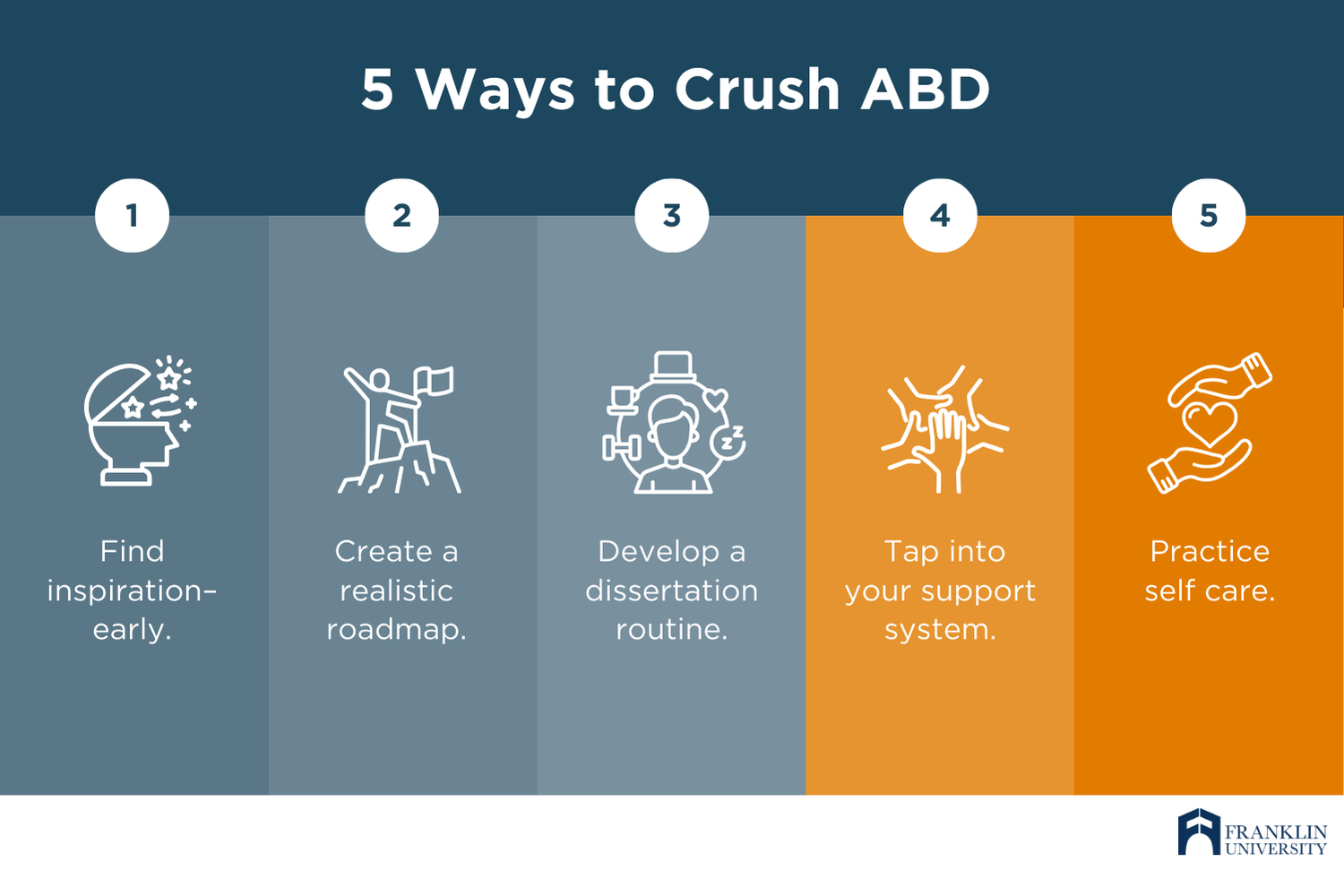Request Information
We're Sorry
There was an unexpected error with the form (your web browser was unable to retrieve some required data from our servers). This kind of error may occur if you have temporarily lost your internet connection. If you're able to verify that your internet connection is stable and the error persists, the Franklin University Help Desk is available to assist you at helpdesk@franklin.edu, 614.947.6682 (local), or 1.866.435.7006 (toll free).
Just a moment while we process your submission.

Setting The Record Straight: ABD (All But Dissertation) Degree Status
It’s not easy to earn a doctorate. It takes hard work, dedication and intense determination to earn a doctoral degree, which is a big reason why so few people earn them. In fact, according to leading labor market analytics firm Lightcast, just 3.6% of all 2021 graduates earned a doctoral degree.
So, what is one of the most common reasons that stops people–perhaps even you–from finishing a doctorate program? Simple: The so-called “dreaded dissertation.”
What Is ABD?
Being done with your doctoral coursework doesn’t mean you’re finished with your doctorate. On the contrary. High-quality doctorate programs require candidates to finish their dissertation before being awarded their doctorate.
If you have everything done but your dissertation, you have what’s known as “ABD” or “all but dissertation.”
Without question, being ABD is as close to earning a doctorate as you can get. But, and it’s a big but, ABD is definitely not the same as completing your doctorate. ABD holds zero academic weight. Moreover, you absolutely, positively cannot be referred to as “doctor” or use the appropriate credential until the dissertation is done.
Listen, if you’re ABD, there’s no shame or judgment. But, if you’re ready to get it done, keep reading to learn how to crush your dissertation and claim the coveted and well-earned title of “Doctor.”
Why Do Doctoral Candidates Stop at ABD? 7 Common Pitfalls (and How to Avoid Them)
.png)
Earning a doctorate is challenging and rewarding, but do you know what to really expect? Download this free guide for tips and insights to help you prepare for success.
Here’s a look at seven common pitfalls that cause doctoral students to drop out or take a break from their degree and stay stuck in the ABD stage.
1. Self Doubt
Q: Is lack of confidence leaving you feeling unmotivated, causing you to push pause on your degree or stop altogether?
If you’re like many students who struggle with imposter syndrome, you may be wondering if you’re really qualified to get your doctoral degree. Deep down you know you are qualified and capable (after all, you finished your coursework successfully). Now go manage your mindset and start moving forward to completion.
2. Time Management
Q: Are you struggling to manage your time or have you fallen behind?
Once you get to the dissertation stage, you no longer have the structure of a typical course with weekly deadlines. This can cause you to fall behind and give up altogether. Get yourself back on track by taking an honest look at where and how you spend your time then reprioritize things. Remember, it’s only for a year or two–not forever.
3. Financial Hardship
Q: Are you facing some unexpected financial challenges or have blown your educational budget?
Earning a doctorate is a significant financial investment. When money issues crop up, instead of pushing pause at ABD, work through it. Take on a side hustle, revamp the budget or talk to your employer about tuition benefits. And, if you have to take a short-term break, do it guilt-free. And, of course, create your own non-negotiable restart plan.
4. Life Circumstances
Q: Are you going through a professional or personal difficulty that requires you to step back from your doctorate?
Whether you have a family emergency or a professional upheaval, some situations are unavoidable. Again, take the time to take care of things–and part of “taking care of things” means deciding when, where and how you’ll pick up where you left off.
5. Dissertation Intimidation
Q: Are you feeling overwhelmed or unsure about progressing through your dissertation?
Starting a dissertation can feel like a 180-degree turn compared to the familiarity and structure of your coursework. Acknowledge the fact that being thrust into the driver’s seat of a dissertation feels daunting and undoable. Then, ask for help from someone who’s been there–another doctoral candidate, a mentor or faculty advisor.
6. Difficulty Writing
Q: Do you struggle with focused and scholarly writing?
The dissertation is extremely intensive, both in terms of research and writing. Honestly? Most dissertations come in at over 100 pages. Despite the difficulty, though, it is doable–especially if you have a workable and practical plan to tackle it in smaller chunks or stages.
7. Lack of Support
Q: Are you feeling alone or unsupported at the idea of moving into the dissertation phase of your doctorate degree?
The solitary nature of a dissertation unnerves many doctoral candidates, so you are far from alone. Naturally the fix is to stop isolating yourself. Ask for help from friends and family. Seek out guidance from an advisor. Lean into your peer group and professional network.
Practical Advice for Overcoming ABD Status
If you’ve started but have yet to complete your doctoral program, the good news is that you are in good company. According to the Ph.D. Completion Project by the Council of Graduate Schools, nearly half of all students who start a Ph.D. program don’t finish.
You, however, can be one of the other 50% who do.
How? By setting yourself up for success by choosing the right university and the best doctoral degree program for you. If you’re ABD right now, your first step is to look for a student-centric program that’s specifically designed to help ABD students finish.
For example, Franklin University’s doctoral programs include the No-Fear Dissertation,TM transfer credit and learning communities, all of which are designed to help students finish–and finish faster.
5 Tips to Complete Your Dissertation and Earn Your Doctorate
1. Find inspiration–early.
Start thinking about the topic of your dissertation at the beginning of your doctorate program. Already ABD? Pick a topic that you’re passionate about before restarting.
2. Create a realistic roadmap.
Take the time to create a plan. Write out the exact steps, milestones and deadlines it will take you to finish your dissertation.
3. Develop a dissertation routine.
Find and stick to a routine. By making the research and writing of your dissertation a normal part of your schedule you can stay on track without overwhelming yourself.
4. Tap into your support system.
Find or create your own support system, both at home and in your program. Ask your family and friends to encourage you and choose a student-centric doctoral program that gives you access to faculty advisors, committee members and peers for mentoring and accountability.
5. Practice self care.
A dissertation isn’t a sprint, it’s a marathon. It can take a year or two to finish your dissertation. So, remember, the more time you put into your dissertation, the faster you can complete it.

The Secret to Finishing Your Doctorate
While there’s much to be proud of when it comes to finishing your doctoral coursework, ABD is not a recognized credential. It takes researching, writing and defending your dissertation to fully complete your doctorate.
From overcoming the obstacles that have contributed to putting your doctorate degree on hold to choosing the right university and doctoral program to having a plan to pick up where you left off, earning your doctorate will be a lot easier (and faster) when you use the tips found here.
Ready to reboot your doctoral journey? Explore these online doctoral programs and make a plan to get back on track.





